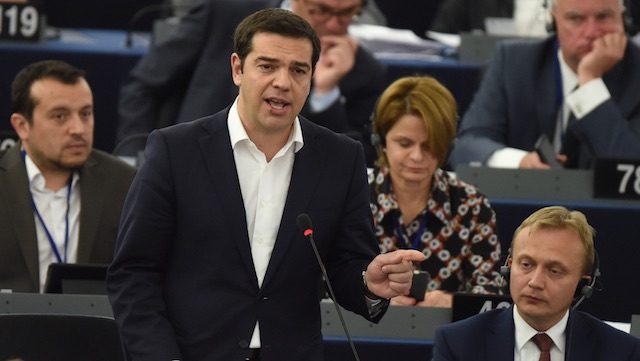SUMMARY
This is AI generated summarization, which may have errors. For context, always refer to the full article.

BRUSSELS, Belgium – Greek Prime Minister Alexis Tsipras vowed Wednesday, July 8, to present “credible” reform plans before a deadline set by exasperated European leaders, as Athens formally sought a new bailout to avoid crashing out of the euro.
Leftist leader Tsipras was greeted by a mix of boos and cheers as he addressed the European Parliament in Strasbourg, France, where he defended an anti-austerity referendum last Sunday, July 5, that dismayed Brussels.
But, as Greece said its banks would stay closed and ATM withdrawals would remain limited until Monday, July 13, in a sign of the deepening crisis gripping the country, Tsipras also promised his blueprint for a new deal would have substance.
“The Greek government will tomorrow file new concrete proposals, credible reforms, for a fair and viable solution,” Tsipras told lawmakers during a heated debate.
Eurozone leaders lost patience at a crisis meeting in Brussels on Tuesday, July 7, after Tsipras and his new finance minister, Euclid Tsakalotos, turned up without any concrete plans for ending the standoff.
They ordered Athens to file a complete reform plan by midnight (2200 GMT) on Thursday, July 9, with European President Donald Tusk saying the “final deadline” for a deal would be at a summit of all 28 EU leaders on Sunday, July 12.
But they struck a more upbeat tone on Wednesday after the Greek government promised to start pension and tax reforms demanded by its creditors next week in return for a 3-year loan to drag its financial system back from the brink of collapse.
In a formal letter to the European Stability Mechanism (ESM) – the lender of last resort set up during the eurozone debt crisis – Tsakalotos said Greece would “immediately implement a set of measures as early as the beginning of next week”.
French Prime Minister Manuel Valls said the proposals were a step in the right direction and reiterated Paris’s stance that keeping Greece in the eurozone was a “geopolitical issue of the highest importance”.
Spanish Prime Minister Mariano Rajoy also said of Greece: “The tune has changed, it’s not what we were hearing until now and that’s positive.”
Hopes that Greece could agree a fresh bailout deal lifted the euro on Wednesday. The single currency was trading at $1.1071 by 0130 GMT, up from a five-week low of $1.0916 on Tuesday.
‘Debt restructuring needed’
But Tusk reiterated Sunday’s summit was the final chance for a deal to avoid a so-called “Grexit” – Greece crashing out of the 19-nation single European currency – which would have global repercussions.
“This is really and truly the final wake-up call for Greece and for us, our last chance,” he said, warning that failure “may lead to the bankruptcy of Greece” and cause geopolitical problems for Europe.
Other leading figures from the world of global finance also cautioned Wednesday that restructuring Greece’s debt mountain had to be a part of a deal.
“Greece is in a situation of acute crisis which needs to be addressed,” International Monetary Fund (IMF) chief Christine Lagarde told a conference in Washington.
Debt restructuring “is needed in the case of Greece for it to have debt sustainability”.
The IMF – which along with the EU and ECB make up Greece’s principal creditors – last week said Brussels would need to stump up another 36 billion euros ($40 billion) to keep the country afloat.
US Treasury Secretary Jacob Lew also weighed in, saying creditors needed to give Greece a path for debt restructuring and growth, warning: “Greece’s debt is not sustainable.”
Greece’s banks were forced to shut their doors and limit withdrawals on June 28 after Athens’s huge EU bailout expired and the country became the first developed nation to default on a payment to the IMF.
On Wednesday, the finance ministry extended “the bank holiday” until the following Monday, while a ministry source said withdrawals would stay capped at 60 euros to avert a cash shortage.
Verge of ‘chaos’
The cash emergency, which has led to long queues at ATMs, has triggered fears for essential supplies in Greece as more and more businesses have been unable to pay bills.
Also on Wednesday, the ECB decided to leave the limit on its stop-gap credit facility that has been providing emergency liquidity to Greek banks unchanged at 89 billion euros, a banking source said.
The head of France’s central bank, Christian Noyer, told French radio he feared Greece could descend into “chaos” without a deal this week.
The fallout from the debt crisis has hit Greece’s vital tourist industry, which has seen last-minute reservations plunge 30%, the Greek Tourism Confederation said.
Experts have also warned the crisis could impede Greece’s ability to cope with the tens of thousands of migrants flooding across its borders looking for a better life in Europe.
Greece has had two international bailouts worth 240 billion euros since 2010, the last of which expired on June 30.
The price of those loans was 5 years of austerity measures, and in Sunday’s referendum Greek voters overwhelmingly rejected more belt-tightening required by creditors. – Danny Kemp, AFP / Rappler.com
Add a comment
How does this make you feel?
There are no comments yet. Add your comment to start the conversation.